Thursday, June 29, 2006
Dickens and Orwell: two centuries or two classes?
[assignment week 4, due Mon.] Simple final blog assignment. Find your favorite telling quote from Hard Times and your favorite from Down and Out in Paris and London, quote them, and compare them stating what you think they say about class. You don't need to write or comment on but you might think about the extent to which Dickens and Orwell were writing about two different periods or about two different strata of society.
Thursday, June 22, 2006
Composed a few miles above Oxford City, On Revisiting the Past Couple of Weeks During a Tour, June 22, 2006
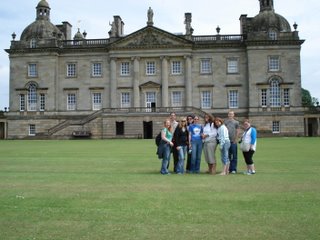 Or should it just state, 'Palladianized'? We visited Houghton and Holkham Halls constructed in the main in the first half of the 18th century last week. Ashley, Ray, Krystal, Megan, Cassie, Amanda, Carrie, Ben, and Kristi can just about be delineated in this picture. I've taught Sir Robert Walpole and I have read quite a bit about Sir Robert, but visiting this pile again (hot and ice water in the dining room?) gives me added insight into the originator of No. 10 Downing Street.
Or should it just state, 'Palladianized'? We visited Houghton and Holkham Halls constructed in the main in the first half of the 18th century last week. Ashley, Ray, Krystal, Megan, Cassie, Amanda, Carrie, Ben, and Kristi can just about be delineated in this picture. I've taught Sir Robert Walpole and I have read quite a bit about Sir Robert, but visiting this pile again (hot and ice water in the dining room?) gives me added insight into the originator of No. 10 Downing Street.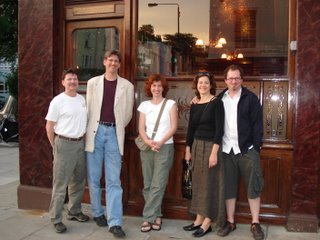
That weekend, many of us travelled across the British Isles. For me, it was down to London, where I greeted my daugther at Heathrow and then met EIU MA in History alumni: Bill (of Houston), Evi (of Innsbruck), and Michael (of Vienna, both of Michael has his arm around Daniella). We are on Portobello Road at the time of this picture, but all the people in this picture have lived in Charleston, Illinois at one time.
Finally, I just thought I'd leave an image for Amanda. Amanda, despite going to university in central Illinois, finds that animals on an estate, particularly domesticated deer, should not relieve themselves wherever they please. I noted the following sign on pavement in London and, perhaps, she might ask them to place same throughout the estates of the aristocracy in future?
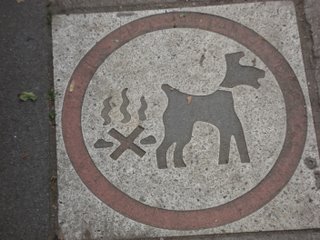 By the way, we need to focus on Hard Times and Cannadine's 19th-century chapter for Monday, and I should have your journals (at least 3 entries per week, and we are now on week 4) by Sunday. I am currently viewing future possible study abroad sites, but will be back Saturday. You may leave same with Dr. Bredesen at dinner Friday night. Got used to having you all around these past two trips and missing you all in Oxford (can that be?).
By the way, we need to focus on Hard Times and Cannadine's 19th-century chapter for Monday, and I should have your journals (at least 3 entries per week, and we are now on week 4) by Sunday. I am currently viewing future possible study abroad sites, but will be back Saturday. You may leave same with Dr. Bredesen at dinner Friday night. Got used to having you all around these past two trips and missing you all in Oxford (can that be?).
Monday, June 19, 2006
The Bath of Defoe, and Bath of Austen
[assignment week 3, due Wed.] Compare and contrast the Bath of Moll and Bath of Anne Elliott. Is the city about class separation or class mixing? Why do they go to (the) Bath? Is the difference one or character or one of period (early 18th, early 19th)? (In your comparison answer two of these three questions.)
Also, prepare one paragraph on your assigned Bath or Cardiff historical personage below in order to be able to tell the rest of the group by Tuesday (in other words, due it today; you should probably do the first blog assignment today as well): John Wood, senior (or the elder, Carrie); Thomas Rowlandson (Cassandra); Beau Nash (Krystal); Ralph Allen (Kristi); John Palmer (Ashley); Dr. William Oliver (Ben); William Wilberforce (Ray); William Gilpin (esp. his Observations on the River Wye and several parts of South Wales, Megan); First and Third Marquess of Bute (focusing on Cardiff Castle, Amanda).
Also, prepare one paragraph on your assigned Bath or Cardiff historical personage below in order to be able to tell the rest of the group by Tuesday (in other words, due it today; you should probably do the first blog assignment today as well): John Wood, senior (or the elder, Carrie); Thomas Rowlandson (Cassandra); Beau Nash (Krystal); Ralph Allen (Kristi); John Palmer (Ashley); Dr. William Oliver (Ben); William Wilberforce (Ray); William Gilpin (esp. his Observations on the River Wye and several parts of South Wales, Megan); First and Third Marquess of Bute (focusing on Cardiff Castle, Amanda).
Monday, June 12, 2006
Defoe and the Patricians and the Plebeians
[assignment week 2. due Wednesday.] How does E.P. Thompson's article "Patricians and Plebs" (versions of which pub. 1974, 1978, combined 1978, penguin ed., pp. 16-49) help us to understand Defoe's Moll Flanders? How does Moll not fit Thompson's model? (Indeed, what is his model?; why does he use it--the latter question we can discuss in class.)
A Busman's Holiday?
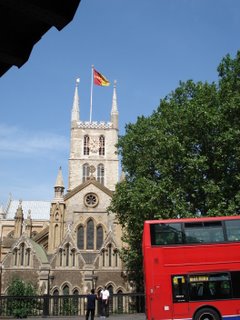
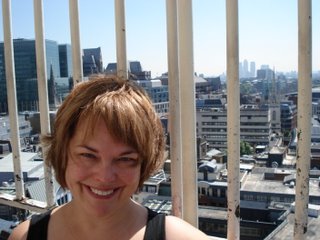 What do professors do on their weekend off? Go to libraries of course. Well, Profs. Newton and Dagni went to London (showing a few of the students how to get signed into the British Library, the Institute of Historical Research, and leaving them with the compatriots at the British Museum). Back to the BL on Saturday, but some time for climbing the Monument commemorating the rebuilding of London after the Great Fire of 1666 (above) and a visit to Southwark (the Cathedral above right) for markets and relaxation (as one might have done in Shakespeare's time). Group will be returning to the Thames on our last week as well.
What do professors do on their weekend off? Go to libraries of course. Well, Profs. Newton and Dagni went to London (showing a few of the students how to get signed into the British Library, the Institute of Historical Research, and leaving them with the compatriots at the British Museum). Back to the BL on Saturday, but some time for climbing the Monument commemorating the rebuilding of London after the Great Fire of 1666 (above) and a visit to Southwark (the Cathedral above right) for markets and relaxation (as one might have done in Shakespeare's time). Group will be returning to the Thames on our last week as well.
Looking for Class in Cambridge
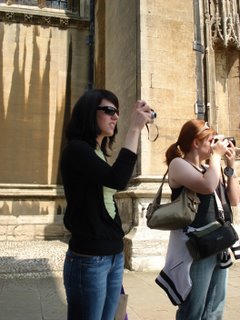 Harlaxtoners Megan and Caroline take pictures of the grass at King's College on which they are not allowed to walk. The first of many steamy, warm days, and our first outing (though the second tour if one includes the tour through Harlaxton by the guides). If class in a 19th-century manor like Harlaxton is denoted by upstairs/downstairs (or, really, the front stairs for the owners and guests, the back stairs for the servants), class in Cambridge was linked to a hierarchical division between scholars, fellows, and masters. Of course, as the quadrangle organization of the colleges (hall, chapel, library, and rooms or dormitory) suggests, the colleges are a guild-like or ordered society like a monastery. "Class" there is more like the estates or orders of the Middle Ages.
Harlaxtoners Megan and Caroline take pictures of the grass at King's College on which they are not allowed to walk. The first of many steamy, warm days, and our first outing (though the second tour if one includes the tour through Harlaxton by the guides). If class in a 19th-century manor like Harlaxton is denoted by upstairs/downstairs (or, really, the front stairs for the owners and guests, the back stairs for the servants), class in Cambridge was linked to a hierarchical division between scholars, fellows, and masters. Of course, as the quadrangle organization of the colleges (hall, chapel, library, and rooms or dormitory) suggests, the colleges are a guild-like or ordered society like a monastery. "Class" there is more like the estates or orders of the Middle Ages.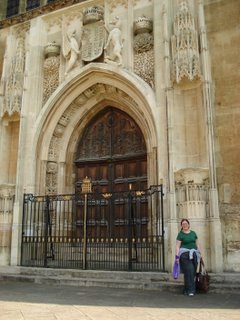
Here we have Harlaxtoner Kristi in front of King's College Chapel. Its perpendicular fan vaulting emphasizes the religiosity of its founder Henry VI and Henry VII. Its large reliefs adorning the inside and outside of the Heraldic signs of the Tudors, Beauforts, etc., emphasize the secular power ideals of its completor, Henry VIII.
I should note that at least one of our classy class, Ashley, has her own blog which not only has a different take on all that we see (and some that only her group sees), but also has some great photos uploaded.
Tuesday, June 06, 2006
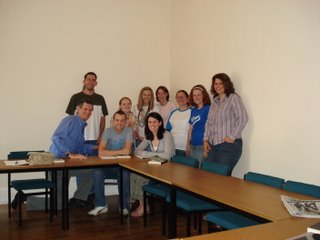
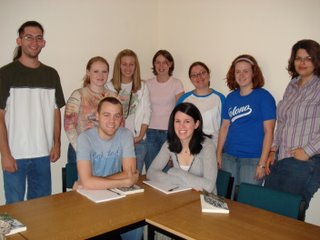 Greetings from Harlaxton.
Greetings from Harlaxton.Incidental housekeeping notes: two rooms blew a fuse, but same reported to maintenance, and now repaired. Students have been to Grantham and back on assignment. I am representing Eastern Illinois at a partners' conference on teaching at harlaxton during the academic year!
We are arranging extra rooms for the students to lessen the numbers per room. I'll email students soon to let you know if that rearrangement is successful. (Ashley met the Principal Gordon Kingsley as we walked the hall looking for the available rooms. Sorry for barging in. He did knock!
Thursday, June 01, 2006
notes for packing and a comment by Linda Colley
Greetings. Virtually everyone has now posted once (thanks!; I was beginning to think I was in the class alone) although someone posted anonymously, so I don't know who that is.
As we get ready to depart I have had queries about what to bring: sheets, towels, alarm clocks, etc. They have sheets and towels, but, as Dr. Bredesen noted an old towel stuffed into a corner of your bag comes in handy (and you can always throw away at the end). As for electronics and material comforts in your room, you might contact your room-mate, and the pairings I have are: Ben Gaylord and Raymond Szarsinksi, Caroline Deters and Kristan Cagle, Krystal Rose and Megan Tellerina, Amanda Terrell and Ashley Moreland, Cassandra Murray with her friend in the English group. In other words, don't bring two of something that you only need one in a room. But I can't tell you what you need for day-to-day living because (1) I don't know you that well; and (2) I've only spent one night in Harlaxton and it wasn't in the student area. I will ask an informant (a student last year), and try to make one more posting about such things. But if you bring clothes, Cannadine, and a willingness to try and learn new things you won't go too wrong.
Still coolish in UK. Up to 71 F (they use Celsius, so weather reports will seem strange) in London when we arrive, but as low as 49 F at night in Grantham. I have made contact with a colleague at Emmanuel College, who has agreed to give us a brief tour around that college as well, so now we have two residential colleges to tour as well as the university (and we'll see many of the colleges as we walk around).
Finally, note the following from the Guardian Weekly, "The feeling is always mutual," by Linda Colley, professor of history at Princeton University, on how American and European prejudices contain awkward truths about the way both sides view each other
As we get ready to depart I have had queries about what to bring: sheets, towels, alarm clocks, etc. They have sheets and towels, but, as Dr. Bredesen noted an old towel stuffed into a corner of your bag comes in handy (and you can always throw away at the end). As for electronics and material comforts in your room, you might contact your room-mate, and the pairings I have are: Ben Gaylord and Raymond Szarsinksi, Caroline Deters and Kristan Cagle, Krystal Rose and Megan Tellerina, Amanda Terrell and Ashley Moreland, Cassandra Murray with her friend in the English group. In other words, don't bring two of something that you only need one in a room. But I can't tell you what you need for day-to-day living because (1) I don't know you that well; and (2) I've only spent one night in Harlaxton and it wasn't in the student area. I will ask an informant (a student last year), and try to make one more posting about such things. But if you bring clothes, Cannadine, and a willingness to try and learn new things you won't go too wrong.
Still coolish in UK. Up to 71 F (they use Celsius, so weather reports will seem strange) in London when we arrive, but as low as 49 F at night in Grantham. I have made contact with a colleague at Emmanuel College, who has agreed to give us a brief tour around that college as well, so now we have two residential colleges to tour as well as the university (and we'll see many of the colleges as we walk around).
Finally, note the following from the Guardian Weekly, "The feeling is always mutual," by Linda Colley, professor of history at Princeton University, on how American and European prejudices contain awkward truths about the way both sides view each other
- "Like the proverbial elephant in the room, American anti-Europeanism has loomed large for so long that few trouble to notice it. After all, Americans visit and live in Europe in large numbers and they are generally civilised, smart and generous.
- "American prejudices about Europe rarely surface in headlines, but they are real, pervasive and ingrained. Much of how Americans have always understood their history, culture and identity depends on positioning Europe as the "other", as that "old world" against which they define themselves. During the 17th and 18th centuries, American schoolchildren learn, European refugees crossed the Atlantic to seek sanctuary in a new, better, more abundant land. In 1776 Americans declared themselves independent not just of the oppressions of George III and the British but also of the taste for monarchy, aristocracy, war and colonialism exhibited by Europeans more generally. Americans were fortunate, George Washington declared in 1796, in being so "detached and distant" from "the toils of European ambition, rivalship, interest, humour or caprice".
- "Some 40 million Europeans chose to migrate to the US in the 19th century. The greater prosperity and political rights enjoyed then by most ordinary Americans, provided they were white, entrenched the view that one side of the Atlantic was intrinsically better and more blessed than the other. "While we shall see multiplied instances of Europeans going to live in America," wrote Thomas Jefferson, "I will venture to say no man now living will ever see an instance of an American removing to settle in Europe." Henry James chose to settle in England, but his novels still endorsed the view that Europe was both corrupt and corrupting. Those of his American characters who cross the Atlantic tend to be inveigled and damaged by the old world, like Isabel Archer in Portrait of a Lady, or are morally contaminated by it, like the expatriate American anti-heroine of The Europeans.
- "Seeing Europe as potentially malignant was in part a tacit American acknowledgment of its superior cultural sophistication and armed force, but as the US became more powerful, so the nature of its anti-Europeanism changed. Europe ceased to seem the place where the future was under construction. Instead, US intervention in two world wars encouraged the American view that Europe's inhabitants were so terminally violent and pathetically incompetent as to need to be rescued from themselves, and that only the US could achieve this.
- "Of course, not all Americans think in these ways or ever have; and historically the US has borrowed ideas and institutions from Europe as much as it has disapproved of and distrusted it. None the less, American preconceptions about Europe require taking seriously.
- "To begin with, they reveal what Americans fear and dislike about themselves. It is now almost de rigueur, for instance, for American universities and radical scholars to teach and write on the iniquities of past European colonialism and imperialism. Fair enough, one might think. But the silence about the history of America's own overland and overseas empire is almost deafening. There is a sense, clearly, in which American anxieties about home-grown aggression and imperialism are being transferred on to Europe. In much the same way, most Americans far prefer books and movies about Europe's undeniable class divisions than to think hard about their own economic inequalities or the very considerable degree of hereditary status and influence in their own land.
- "There is a more specific sense in which American anti-Europeanism functions as a kind of self-commentary. In the past America's white elite cherished Europe as well as suspecting it. They adopted European fashions, built universities like Oxford and Cambridge, went on grand tours of European cities; and many of these American patricians were Wasps, white Anglo-Saxon Protestants. As the US population has become more diverse, however, so the authority of this old elite has diminished."
Subscribe to:
Posts (Atom)